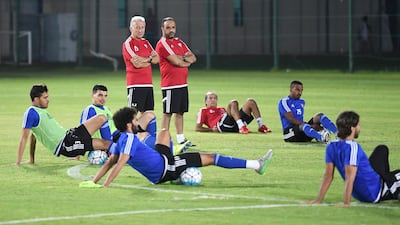At first, Italian Alberto Zaccheroni did not seem an obvious choice for Japan.
A vastly experienced manager, his reputation had been built upon 27 years of coaching clubs in his homeland. During that time, he rarely spoke publicly of a desire to work abroad. When appointed Juventus manager on a caretaker basis in 2010, drafted in to rescue an underperforming heavyweight, Zaccheroni said managing outside Italy did not particularly appeal. He regarded football in his own country too highly.
Within four months he had guided Juventus to qualification for the Europa League, yet it was deemed not enough for him to stay on. Soon, Zaccheroni went where few expected. At the end of the summer, he was announced as the new manager of the Japanese national team. Takeshi Okada had left following the South Africa World Cup, when Japan had far exceeded expectations, coming within a penalty shoot-out of quarter-final place.
The Japanese Football Association (JFA) were linked with several high-profile names, primarily top managers from Spain. Eventually, they opted for Zaccheroni.
Despite never managing outside Italy, and never before in international football, Zaccheroni began his tenure brilliantly. He opened with a friendly victory against Argentina. A few months later, he won the Asian Cup, defeating South Korea in the semis and Australia in the final. The achievement reverberated in Italy, with Alessandro del Piero and Gianluigi Buffon, the Juventus captain and goalkeeper respectively, sending messages of congratulations.
Riding the momentum, Zaccheroni went unbeaten through his first year in charge. It spanned 17 matches and included a European tour highlighted by victory against Belgium and a draw with the Netherlands.
Fastened tight to a 4-2-3-1 formation, Zaccheroni was underlining his reputation as a strategic manager with a strong preference for attacking football. He did not conform to the stereotype of the typical Italian tactician, a relic from his early days in club management, when he favoured a 3-4-3 system. At times in Italy, he was praised for his boldness. When it went wrong, he was criticised for being too unbending.
Then, at the 2013 Confederations Cup, Japan lost all three matches. They were defeated resoundingly by hosts Brazil. They responded by scoring three against Italy, but eventually losing by one goal. Zaccheroni, though, later heralded the match for buttressing belief among his players. “A child who never falls never learns to fall,” he said. Weeks later, Japan won the East Asian Cup.
Yet cracks began to appear during the build-up to the 2014 World Cup. Japan were inconsistent as Zaccheroni’s emphasis on attack had neglected vulnerabilities at the back.
Still, they went to Brazil cautiously optimistic. They departed as soon as the group stages concluded, coming last in a pool that contained Colombia, Greece and Ivory Coast. They failed to win a match.
_________________________
Read more:
- Injury problems mount for UAE manager Alberto Zaccheroni as Ali Mabkhout withdraws
- Alberto Zaccheroni names first UAE squad for Haiti and Uzbekistan friendlies
- UAE friendly against Egypt cancelled as FA search for last-minute opponents
- Al Nasr manager Cesare Prandelli 'certain' Alberto Zaccheroni will succeed with UAE
_________________________
Zaccheroni stepped down, but he was hardly pilloried. The players never criticised him, not throughout his reign or following the World Cup. When defender Yuto Nagatomo cried in front of the press after Japan’s exit, it was interpreted as a sign of how much the team wanted to come through for their manager.
Their loyalty was understandable. Zaccheroni had kept faith with largely the same side that won the Asian Cup. “I’m this team’s biggest fan”, he once said. Initially a strength, his inflexibly ultimately proved his undoing. He did not experiment. He could be stubborn, wedded to his trusted core of players, to the 4-2-3-1 formation.
Conversely, it was part of is appeal. The Japanese value loyalty, so Zaccheroni was received well by the team, the supporters and the media.
Always, he prioritised the team ethic. “Just as Brazil cannot win with Neymar alone, or Argentina with Messi, I expect the team as a whole to get the results," he said.
His lieutenant on the pitch was Makoto Hasebe, integral to keeping the “right balance” in the side. A former AC Milan manager, Zaccheroni once reportedly told the midfielder “you and Paolo Maldini are my only full-time captains”.
In all, Zaccheroni was viewed as a players’ manager, just as he had been for the majority in Italy. Oliver Bierhoff, the Germany striker who Zaccheroni had at Udinese and took to Milan, said he was "the only coach who really understood me".
Andriy Shevchenko noted: “It was thanks to [Zaccheroni] I became a key player at Milan. He showed me how to improve my game in Italy, to develop as a player and as a man."
At Japan, Zaccheroni reached out regularly to various members of his team. He was commended for his lack of ego, even though he had won Serie A with Milan in 1999, and managed Italy’s Big Three of Milan, Inter Milan and Juventus, among others. To his credit, he never looked down on Japan, or on Asian football.
Zaccheroni's relationship with the media was convivial. He was easy to deal with, although the JFA are famously protective of their managers. He had embraced the country and the culture. During his four years in charge, he travelled around Japan in his spare time. He lived in central Tokyo, taking the subway or the train to get around.
Speaking before the World Cup, he said: “Given the time, I’d have loved to learn more about other Japanese sports and also look around towns outside Tokyo more slowly.”
A manager who once had seemed set to remain in Italy had broadened his horizons. A belated wanderlust has taken him to China last year, and ultimately, led him to the UAE now.


